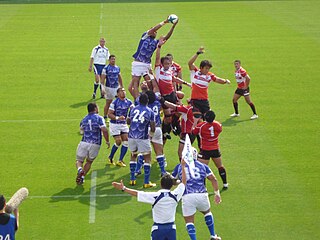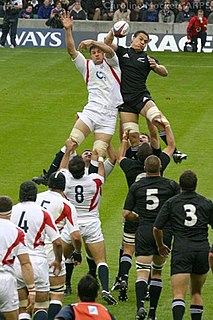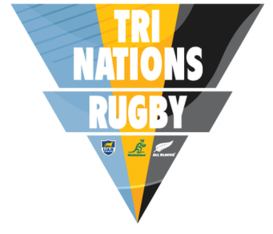
The New Zealand men's national rugby union team, commonly known as the All Blacks, represents New Zealand in men's international rugby union, which is considered the country's national sport. The team won the Rugby World Cup in 1987, 2011 and 2015.

The Rugby Championship is an international rugby union competition contested annually by Argentina, Australia, New Zealand, and South Africa. These are the four highest ranked national teams in the Southern Hemisphere, the Six Nations is a similar tournament in the Northern Hemisphere.

Super Rugby is a men's professional rugby union club competition currently involving teams from Australia and New Zealand. It previously included teams from South Africa, Argentina, and Japan. Building on various Southern Hemisphere competitions dating back to the South Pacific Championship in 1986, with teams from a number of southern nations, the Super Rugby started as the Super 12 in the 1996 season with 12 teams from 3 nations: Australia, New Zealand, and South Africa. The Super 12 was established by SANZAR after the sport became professional in 1995. At its peak the tournament featured the top players from nations representing 16 of the 24 top-three finishes in the history of the Rugby World Cup, and is widely regarded as rugby union's strongest provincial competition. After the COVID-19 pandemic forced the competition to split into three, the reformed competition in 2021 and beyond will only include Australian and New Zealand clubs.

The Australia national rugby union team, nicknamed the Wallabies, is the representative national team in the sport of rugby union for the nation of Australia. The team first played at Sydney in 1899, winning their first test match against the touring British Isles team.
The 2006 Tri Nations Series was the 10th Tri Nations Series, an annual rugby union competition between the national teams of Australia, New Zealand and South Africa. New Zealand won the competition with three rounds still to play after their victory over Australia on 19 August, their 21st consecutive home win.

The Pacific Nations Cup is an international rugby union competition held between three Pacific states: Fiji, Samoa and Tonga. The 2019 edition of the tournament will also include the national teams of Canada, Japan and United States. First held in 2006, the tournament is intended to strengthen the Tier 2 rugby teams by providing competitive test matches in a tournament format.
The 2005 Tri Nations Series, an annual rugby union competition between the national teams of Australia, New Zealand and South Africa, was the tenth in the series. The competition is organised by SANZAR, a consortium of the three countries' rugby federations. This was the last year in which the Tri Nations was contested in its original double round-robin format, with each team playing the others twice.
The 2004 Tri Nations Series, an annual rugby union competition between the national teams of Australia, New Zealand and South Africa, was the ninth in the series. The competition is organised by SANZAR, a consortium of the three countries' rugby union federations. The series was contested in its original double round-robin format, with each team playing the others twice.

SANZAAR is the body which oversees Super Rugby and The Rugby Championship competitions in rugby union. SANZAAR meets annually and is composed of the CEOs from its member unions.

Rugby union is a football code within Australia with a history dating back to 1864. Although traditionally most popular in Australia's rugby football strongholds of New South Wales, Queensland and the ACT, it is played throughout the nation.

The Super 10 was a rugby union football tournament featuring ten teams from Australia, New Zealand, South Africa, Tonga, and Western Samoa. The competition ran for three years from 1993 to 1995 and was the predecessor of Super 12 and Super 14, now known as Super Rugby.

Rugby union is the unofficial national sport of New Zealand. The national team, the All Blacks, is currently ranked the second best international rugby team in the world, after South Africa. The sport has been known in New Zealand since 1870. The top domestic competitions are the semi-professional Mitre 10 Cup and amateur Heartland Championship, and above them Super Rugby, in which New Zealand has five franchises. The country co-hosted and won the first ever Rugby World Cup in 1987, and hosted and won the 2011 Rugby World Cup. They have won three World Cups, tied with South Africa, the most of any other country. They are also the current World Champions in 7s rugby for men and women.
The 2008 Tri Nations Series was the thirteenth annual Tri Nations competition between the national rugby union teams of New Zealand, Australia and South Africa. The All Blacks won the series on 13 September 2008 after defeating Australia in the last match of the series.
The Rugby League Four Nations, is a biennial rugby league football tournament run in partnership between the Australian Rugby League Commission, Rugby Football League and New Zealand Rugby League representing the top three nations in the sport: Australia, England and New Zealand. The tournament replaced the previous Tri-Nations format by including a fourth nation that qualifies by winning their respective regional competition in a rotation between Europe and the South Pacific. France accepted an invitation to play in the inaugural tournament in 2009. No tournament was contested in 2012 to allow teams to prepare for the 2013 Rugby League World Cup. No tournament has been played since 2016.

Morné Steyn is a South African rugby union player who plays at the Flyhalf position. He plays at number 10 for the Springboks internationally, as well as for Vodacom Bulls in the Super Rugby competition.

The 2003 Rugby World Cup was the fifth Rugby World Cup and was won by England. Originally planned to be co-hosted by Australia and New Zealand, all games were shifted to Australia following a contractual dispute over ground signage rights between the New Zealand Rugby Union and Rugby World Cup Limited. The pre-event favourites were England, regarded by many at the time as the best team in the world. New Zealand, France, South Africa and defending champions Australia were also expected to make strong showings, with New Zealand being second favourites after victory in the southern-hemisphere Tri-Nations championship.
The Australian Provincial Championship, or APC, is a now-defunct rugby union football competition played in Australia. It was one of several provincial competitions since the late 1960s, including the Wallaby Trophy and Ricoh National Championship, that have not continued.
The 2019 Rugby Championship was the eighth edition of the annual southern hemisphere Rugby Championship, featuring Argentina, Australia, South Africa and New Zealand. The competition is operated by SANZAAR, a joint venture of the four countries' national unions.

The 2020 Tri Nations Series was the seventeenth edition of the annual southern hemisphere competition, involving Argentina, Australia and New Zealand. On 16 October 2020, 2019 Rugby Championship winners and 2019 Rugby World Cup champions South Africa confirmed their withdrawal from the originally planned 2020 Rugby Championship due to South African government travel restrictions, player welfare and safety concerns related to COVID-19. This meant that the competition temporarily returned to its previous Tri-Nations format - played across six weekends with each team playing each other twice.













